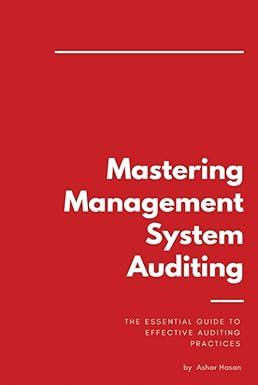Question
Atlas Ltd is a major Australian bicycle manufacturer. Over the last decade, bicycle manufacturers from China and Nepal have been able to price their bikes
Atlas Ltd is a major Australian bicycle manufacturer. Over the last decade, bicycle manufacturers from China and Nepal have been able to price their bikes below those of the Atlas products, but the company has retained its market share due to the poor quality of the imported bikes. Recently, however, the quality of the imported bikes has improved, and Atlas has had to cut prices to maintain market share. The managing director, Michael Atlas, is concerned about the viability of the business at these lower prices and asks the head of the accounting team, Zoe Barnes, to investigate the problem.
Barnes's initial investigation indicates that the lower prices cannot be sustained in the longer term, as they do not cover the costs of manufacture, let alone contribute to the company's selling and administrative costs. She looks for possible cost reductions. The company has always had a reputation for high quality, but Barnes feels that there are substantial costs incurred in attaining this level of quality. She knows that there are extensive quality inspection checks throughout the production process and that many employees spend part of their time reworking defective parts. She has also noticed the buckets full of scrapped parts and components spread throughout the factory. These costs are not recorded separately in the existing accounting system. Barnes asks Atlas to support the development of a cost of quality system.
Atlas: What do you mean? A system that records the costs of poor quality?! Our bikes are among the best in terms of quality!
Barnes: I know that, Michael, and we know what it costs us to make our bikes, but we've got no idea how much of that cost is related to ensuring quality. I think the cost of quality here is very high. What if it's a third of our manufacturing costs? And what if we could reduce it without compromising our quality? We could keep our prices down and still make a good profit.
Atlas: Okay, Zoe. Give your cost of quality system a try, though I don't see how it will help. Everybody knows that good quality costs money. Even if we do find out our cost of quality, I don't see how it will help us reduce it.
Barnes: Michael, good quality doesn't seem to cost money in China and Nepal. Their prices haven't gone up, even though their quality has. You'll soon see that understanding quality costs can help you to reduce them and to improve quality at the same time.
Required:
- What have I learnt from the Case and what insights have I gained to develop my skills?
- What is (are) the fundamental issue(s) that underpins the case?
Step by Step Solution
There are 3 Steps involved in it
Step: 1

Get Instant Access to Expert-Tailored Solutions
See step-by-step solutions with expert insights and AI powered tools for academic success
Step: 2

Step: 3

Ace Your Homework with AI
Get the answers you need in no time with our AI-driven, step-by-step assistance
Get Started


